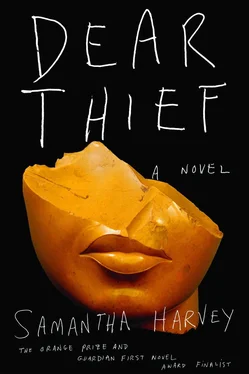But you did not bury yourself, either; you would get so far into your troubles and then break out irritably, impatiently, would throw your head back in raucous laughter and shrug the world off. Last night when Muyi was talking about New York speakeasies, I could see you with him and I could no longer justify, even to myself, my solitary confinement of you in a forest. I am sorry for this, sorry for the geese, whose concept I knowingly abused.
One stiff frosty evening not long before you left I brought coffee to your room and sat on the floor while you told me how the flight of the goose is the symbol for escaping continual rebirth, getting out of this agitated world. The goose flies, we break free at last without needing to come back and do this life again. Do you remember saying this? You pulled back the plunger and I saw a swirl of blood rise up in the needle, and then you closed your eyes and said that you could taste it in your mouth, and then that you were washed with warmth, and then you stood by the condensated window with your fingertips touching the pane until droplets ran down.
‘Anything is possible,’ you said, spreading your hand against the glass. ‘Ask me to do anything and I will be satisfied doing it.’ You regarded me with wide eyes and such deep stretching peace. Your hand slid down the pane and lay on the sill. You told me there was not one grain of fear or discomfort in you and nothing you could not or would not do, and do again, and love. You were made of light, were part of everything. Every beautiful detail of your childhood was right here to be lived again, you were burying Petras in the sand, you could feel the air on your back teeth. A most lovely sensation, the air there. Whatever you needed to do or be you could do or be. Nothing impeded. You had hit the ceiling and ripped through it, ripped through the gauze, there was light everywhere and you were it. Total acceptance of the way things were, gone any trace of desire to harm or bear a grudge, you were saying the word harm but it was a sound, the concept meant nothing to you any more. Instead of it you had the most visionary focus and patience, your beliefs came in colours and smells that overwhelmed the world with sense, logic and beauty, because there was nothing wrong, nothing to put right, no barriers, no emptiness. You were the goose in flight from the anxiousness and suffering of the world. I am the goose, you said with a shallow, euphoric smile as you rested your head against the wet pane. I am the goose!
I know you did not even notice when I left the room and went downstairs. There is nothing worse than witnessing somebody else’s salvation, Butterfly, when all you want is your own — when you were promised your own, when you grew up to believe there would be a great reward. And now, well, how easy it is to start living out one’s own reveries about the other, or worse still to project the future one thinks the other deserves, rather than the one she probably gets.
I have kept you lonely and baffled by the Upanishads. Your vegetables grow and their abundance reminds you of all the people you cannot share them with. I have given you a lake and not let you swim in it. Your video collection is very poor, even by your own standards; the geese fly but they are trapped in the screen and will never be free. Your beauty is for nobody to see. Your forest is nondescript when it comes down to it, just trees, all of them straight and none of them perfectly straight. I have given you food that makes you thinner. I have been untying the ropes on your charpoy one by one so that your sleep gets ever more uncomfortable, until you cannot sleep at all. I have given you one pen, and soon I will take it away. Then you will not even be able to keep a record of your life, and so you will be undone, my friend, you will be undone.
They have it that jealousy is the most corrosive of emotions and I have felt it corrode me and whittle me down to something dishonourable, this is the truth. I have looked at — not even taken from its box, just looked at — the lock of your hair and have been filled with heat that is as close to panic as to any other emotion I can name, the kind of panic one feels when one’s place is threatened. A survival response perhaps, one that comes from seeing that one’s position in the world is not central or has been usurped.
I generally dislike this tendency in us to try to boil down everything we think, do and feel to a base instinct for survival, as if we are not responsible for our reactions, or as if we have no choice. But in this case perhaps it is true; we realise that somebody we love has loved someone else more, and we feel swiped aside like a skittle. Nothing essential holds me in place, all that I am is swiped aside and scuttled out of sight. For good or bad this is how I feel when I look at that lock of hair. I can’t touch it; I can only take out one of the ten-pack of cigarettes that I buy after the life-class, light up, stand back and inspect it from a cautious distance. Why did she? I think. Why did they? How did they? Was it worth it?
This is not something I very readily admit, and I will never tell Nicolas, but I went to stay at Mrs Ellis’ guest-house once. It wasn’t run by Mrs Ellis any more, but a man called John or Simon or Peter Ellis, who I assume was her son. I knew that Nicolas used always to rent the back room on the first floor because he mentioned once its view of the garden, which Mrs Ellis stocked with bird food. The roof of the portico, which was just below his window, was harangued (his word; this is the only time I ever remember him using it) with birds that landed on his sill. He kept his window shut. How could he complain? If he resented Mrs Ellis’ kindness towards birds he would have to resent it towards himself too.
I booked in advance and asked for this room. It was big and light. There was an iron-framed double bed against the left wall, badly made with sheets and blankets that pined for a hospital corner — an old pink, patchily bare woollen blanket, and pastel-striped pillows, a thick towel on the end of the bed that smelt of packaging. Nets at the window with worn lace, a tasselled lamp on a cheap, modern bedside table of plasticky pine, what would once have been a handsome wardrobe with broken fretwork above the doors, a light-blue carpet, a floral border on the woodchipped walls, a discoloured landscape print above the bed, a travel kettle with a limescaled spout, instant coffee, no teabags, no milk, three ashtrays (on the kettle tray, on the bedside table and on the windowsill), a dressing gown hanging on the back of the door as if somebody had left it there in error, a clean but not fresh smell.
I arrived in time for bed. I did nothing there but go to bed, not even wash. I used the toilet in the bathroom across the corridor, that was all. Because I always sleep naked I made myself, but I didn’t want to. For an hour I lay in bed with only the light from the lamp and with my arms by my side on top of the covers; I suppose this was about nine years ago, I was forty-three or forty-four, although I don’t know why this is relevant to mention. Just that I saw myself then as I was writing and my hair was long and my skin holding on to a last sheen of youth. The cheap pine bedside table looked like a new thing, otherwise I expect the room was exactly as it had been when you were there. I doubt if the son had done anything to the guest-house since his mother, presumably, passed away, he was just running it down — it had that feel in any case.
One of those nights passed when you don’t know if you really ever slept. The hours slip away somehow. There was an uncanny quiet stillness for a long time of the sort you would never expect in London, but then Nicolas did always remark on how quiet it was there. I will tell you what I imagined: he is agitated and belligerent, a mood you have not seen in him before, and he stands by the window with his hands in his pockets. You have had a long train journey together and although it was spent largely in silence, there is anyhow nothing left to say and you wish he would snap out of this mood. He brought you here, bundled you on a train so unceremoniously, you did not ask him to come with you, you did not ask him to bring you to this place. He is cross because you left, cross because you have come back; you simply can’t win. You take your clothes off, sit on the end of the bed and shrug: This? If not this, then what?
Читать дальше












